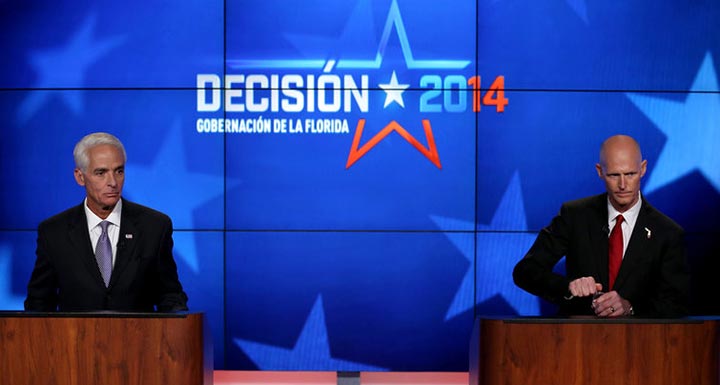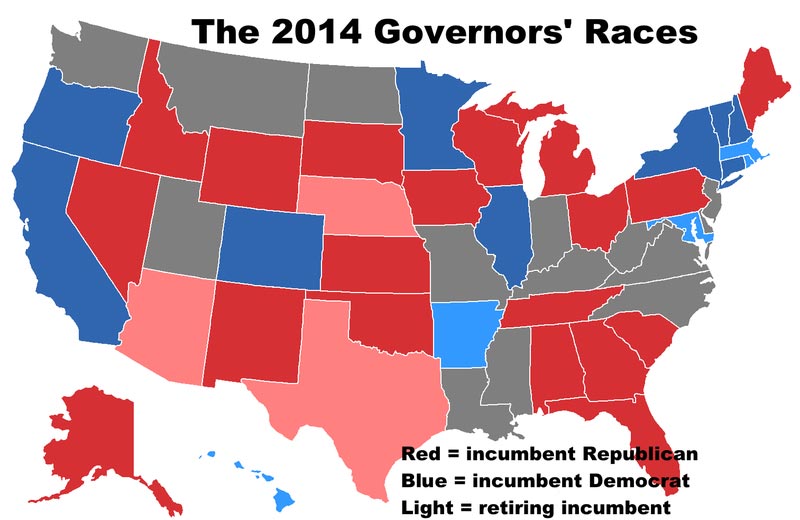
Just because Congress is hopelessly broken doesn’t mean the midterms are meaningless
The 2014 midterm elections are attracting the lowest level of public interest in years largely because the stakes seem so low. Partisan control of the United States Senate over the next two years certainly matters — if nothing else because the judiciary matters — but with Washington already gridlocked, simply ratcheting up the gridlock doesn’t seem like that big a deal. But while this analysis isn’t wrong (2014 is certainly no 2010 or even 1998) it does miss something really important — most public policy in the United States of America doesn’t flow from Washington, DC and the biggest stakes in this year’s midterm have nothing to do with the Senate.
 Most states, including states that contain the vast majority of the American population, are electing new governors this fall. Those states — plus a few others — are also renewing their state legislatures this year. And alongside the governors are the sundry attorneys-general, comptrollers, insurance regulators, and other statewide officeholders who are elected in the United States. Below those officials there will be dozens upon dozens of elections for mayors and country executives and sheriffs and district attorneys and state judges. Many of these races aren’t close, and many of them are relatively unimportant when viewed individually. But many of the races are close. And the question of whether a Democrat or a Republican will govern a large state such as Florida, Pennsylvania, Michigan, or Illinois is far more important than any individual Senate seat and possible more important than majority control of the Senate.
Most states, including states that contain the vast majority of the American population, are electing new governors this fall. Those states — plus a few others — are also renewing their state legislatures this year. And alongside the governors are the sundry attorneys-general, comptrollers, insurance regulators, and other statewide officeholders who are elected in the United States. Below those officials there will be dozens upon dozens of elections for mayors and country executives and sheriffs and district attorneys and state judges. Many of these races aren’t close, and many of them are relatively unimportant when viewed individually. But many of the races are close. And the question of whether a Democrat or a Republican will govern a large state such as Florida, Pennsylvania, Michigan, or Illinois is far more important than any individual Senate seat and possible more important than majority control of the Senate.
What’s more, the various state level races are overwhelmingly more important than this year’s congressional elections when taken as a whole.
State government in the United States provides the lion’s share of funding for K-12 schools, and thus gets the loudest voice in their management. State government — not the feds — runs public universities and determines the long-term drivers of college costs and student debt. States regulate the actual provision of health care, unnecessarily driving up costs to please interest groups or limiting access to abortion or other contested procedures. It is state governments that regulate the institution of marriage, and determine the legal status of marijuana. Most of criminal justice is in the hands of state and local governments, so if you care about racial inequities in that area that’s where you have to look. State and local governments also write the rules that drive housing scarcity, and they run the transportation system.
Obviously foreign policy, big-picture welfare state decisions, bank regulation, and other mostly federal matters are a big deal. But a huge amount of what people care about — especially the ways in which government intersects with daily life — is in the hands of state and local officials. State officials are even in charge of election administration (remember Katherine Harris and the hanging chads) and drawing congressional districts so what happens in the states in 2014 will drive 2016 outcomes at all levels.
Especially at a time when Congress seems destined to remain broken and ineffective regardless of the results on Election Day, this is where the real midterms stakes are to be found.


